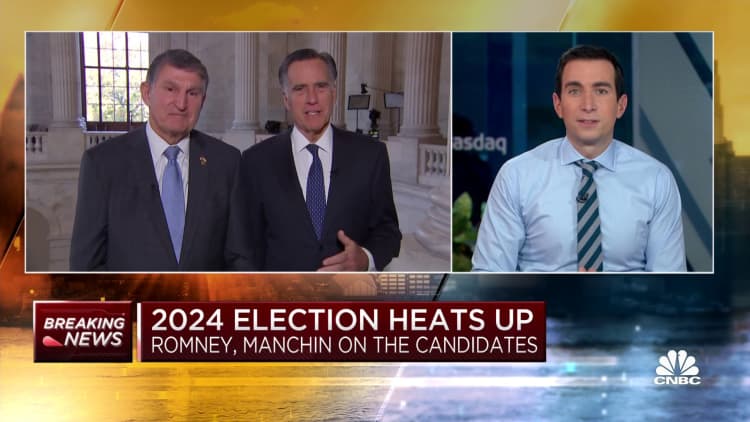No Labels, the nonprofit group actively working to field a third party ticket for president in 2024, doubled its annual revenue last year over 2021, collecting $21 million, nearly all of it from wealthy donors who gave $100,000 or more.
No Labels is not required to publicly disclose the names of its donors, but CNBC obtained a list from the group of contributions last year that exceeded $5,000.
The list did not include names, but it revealed that around 80% of the group's total revenue, roughly $17 million, came from at least 68 individual donors who each gave the group $100,000 or more.
The 990 tax return also revealed that No Labels had only one program last year, which it called, "citizen engagement, digital and grassroots movement building and ballot access."
"We have developed leadership networks in all 50 states to establish grassroots support among communities across the country who share No Labels' values," the group wrote. The cost of this effort was just shy of $9 million.
As No Labels works to gain ballot access in all 50 states next year for a potential third party presidential candidate, the scale of the individual gifts suggest that No Labels has a solid base of very wealthy donors, people it could potentially tap for even bigger donations.
But the fact that the group relies so heavily on a relatively small number of wealthy individuals also underscores the limitations No Labels faces, as it struggles to rebrand itself as a grassroots movement, far away from the rarified circles of Wall Street and Washington.
Still, without an actual candidate on its ticket, No Labels is still effectively just the idea of a third party, and not an actual alternative to either Democratic President Joe Biden or Republican front-runner Donald Trump.
Ryan Clancy, the chief strategist for No Labels, defended the group's refusal to reveal its donors.
"No Labels will never run a presidential campaign. No Labels' only job is to get a ballot line," Clancy told CNBC. "Once we offer our ballot line to a unity ticket, that ticket will be obligated to follow all of the relevant FEC [Federal Election Commission] laws that govern candidates and electoral politics, including disclosing the names of their donors," Clancy said.
So far, No Labels has managed to secure a line for its candidate in the 2024 presidential election on the ballots of 12 states, according to NBC News.
But it has already begun forming a committee to review potential 2024 candidates for its ticket, former Senator Joe Lieberman, the founding chairman of No Labels, recently told Fox News.
Outgoing Sen. Joe Manchin, D-W.Va., has long been rumored to be among the possible candidates to top a No Labels unity ticket.
That speculation soared last week when Manchin announced he would not seek reelection. Manchin also recently told NBC News he "absolutely" would consider running for president.
As a tax exempt nonprofit, No Labels is prohibited from directly contributing to a political campaign. But it has an affiliated super PAC that is permitted to do so.
That group has raised $1.4 million so far this election cycle, according to Federal Election Commission records.
Harlan Crow, a Texas businessman and associate of Supreme Court Justice Clarence Thomas, gave $5,000 to the super PAC earlier this year, according to an FEC record.
Philanthropist Wilhelmina Robertson and Mark McClain, the CEO of SailPoint Technologies combined to give $125,000 to the super PAC, according to the records.



